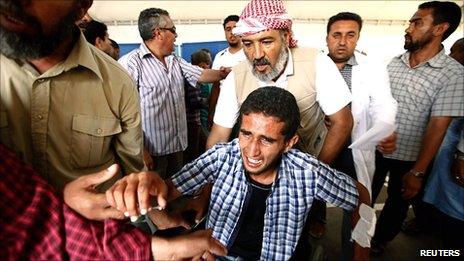Libya crisis: Misrata rebels begin tactical manouevring
- Published

On Wednesday, with so many casualties on the front line - in rocket attacks that followed a rebel offensive - Misrata felt more than ever like a city under siege.
Stopping for a cup of coffee in the morning, we were told that we would have to take it away, we could not drink it there.
Chairs were stacked on tables inside; the owner said it seemed frivolous to be serving coffee, and did not want gossip in his shop with so many people risking their lives on the front line.
The usual coffee bar we go to on the other side of the street was already closed. And, as if to make a point, a funeral procession passed of a fighter killed just a few hours before.
Volunteers tried to control traffic that had built up outside the private hospital which is now the main casualty clearing point, while a radio appeal went out for blood donors. A crude hand-drawn sign sent drivers with a rare blood group towards priority parking spaces.
The two most important defensive lines control the main east-west coastal road that is Libya's artery in better times.
It is a four-hour drive to Benghazi to the east and not much more than two to Tripoli to the west.
Further defences are scattered across a less well-defined front line among flocks of sheep in rolling farmland to the south.
The front lines were set up at the borders of the district of Misrata after Col Muammar Gaddafi's troops were pushed out of the city in fierce house-to-house fighting in April and May.
When the final story of Col Gaddafi's downfall comes to be written, as seems increasingly likely, the courage of this resistance - fought with huge losses against a ruthless enemy - could prove the decisive chapter of Libya's revolution.
Growing competence
Breaking out of this rebel enclave is the next phase, and it looks as if this week it has started.
A series of probing raids began to the west on Monday, and then on Tuesday and Wednesday the first serious fighting happened on the eastern front line.
Fighters who spoke to the BBC said they had come within sight of the outskirts of the next town, Tawargha.
There has never been any doubt about the courage and resolve of a city mobilised for survival, but there have been questions up to now over the technical competence of a citizen army, most of whose men had not handled a weapon until this year.
They are now engaging in tactical manoeuvres, holding their ground, and using rifles and rocket-propelled-grenade launchers with far more ability.
And although they still lack the ability to use tanks or any other heavy artillery left over from Col Gaddafi's troops, they have welded rocket-launching pods taken from helicopters onto the back of modified pick-up trucks, along with anti-aircraft guns and Grad rocket launchers.
Red lines
In the advances of both fronts, they moved forward across "red lines" agreed with Nato, and are setting up forward defensive positions.
The red lines were established to give Nato jets the ability to launch strikes on moving vehicles knowing they would be Gaddafi forces. But the move forward implies that those red lines are not fixed.
In any case, the head of military intelligence for the rebel side and military spokesman, Ibrahim Battalmal, has told the BBC they do not depend on Nato support for these smaller tactical skirmishes.
Since British Apache and French Tiger helicopters entered the campaign last week, none has been used on this front - a fact confirmed by a fighter on the eastern front, Ibrahim Arifa, who said: "We saw jet fighters in the morning, but not helicopters."
In advances in both directions, fighters said pro-Gaddafi soldiers whom they had captured had been trying to give themselves up.
This could be wishful thinking, but it could imply the relentless bombing that the Gaddafi government and forces have sustained this week - in day and night-time raids over Tripoli, might finally have broken its ability to manage its forces.